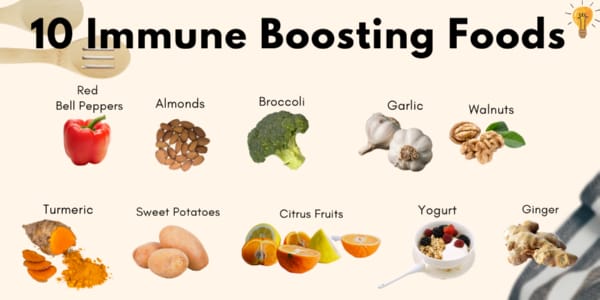



The Ultimate Guide to Boosting Your Immune System Naturally
Are you tired of seasonal sniffles and feeling run down? Many people wonder how to boost immune system naturally for year-round resilience. This guide offers a comprehensive, science-backed approach, from foundational lifestyle habits to advanced nutritional strategies. If you're ready to take control of your well-being, discover how iMissoft can support your health journey.

Understanding Your Immune System: A Quick Overview
Before we dive into boosting it, let's quickly understand our body's defense department. Your immune system is a complex network of cells, tissues, and organs working together to protect you from harmful invaders like bacteria and viruses. What truly weakens your immune system? Often, it's a combination of factors we can control.
The Two Arms of Immunity: Innate vs. Adaptive
Your body has two main lines of defense. Your innate immunity is your first, rapid-response team. It includes physical barriers like your skin and general-purpose defender cells. Your adaptive immunity, on the other hand, is smarter and more targeted. It learns to recognize specific pathogens and creates a "memory" to fight them off more efficiently in the future. A strong defense requires both arms to be in top shape.
What Weakens Your Immune Defenses? Common Culprits to Avoid
Several factors can compromise your defenses. Chronic stress, poor sleep, a nutrient-poor diet, and a sedentary lifestyle are major culprits. Understanding these allows you to make targeted changes for better immune support. Consistently addressing these areas is the first step toward a more robust system.
Lifestyle Habits for Robust Immune Support
You can significantly strengthen your immune system with simple, consistent lifestyle changes. These foundational habits create the right environment for your immune cells to thrive. They are often the most overlooked yet powerful tools at your disposal.
The Critical Role of Quality Sleep for Immune Cell Production
How does sleep affect immunity? During sleep, your body produces and releases cytokines, a type of protein crucial for fighting infection and inflammation. Lack of quality sleep can decrease the production of these protective proteins and other immune cells. Aiming for 7-9 hours of quality sleep per night is non-negotiable for powerful immune support.

Managing Stress: How Cortisol Impacts Your Immunity
Long-term stress and immunity are closely linked. Chronic stress elevates cortisol levels, a hormone that can suppress the effectiveness of your immune system. Incorporating stress-management techniques like mindfulness, yoga, or deep breathing can lower cortisol and allow your immune system to function optimally.
The Power of Regular, Moderate Exercise
Regular physical activity is another pillar of a healthy immune system. Moderate exercise can improve the circulation of immune cells, helping them detect and fight off infections more quickly. You don't need to be a marathon runner; a brisk 30-minute walk most days of the week is enough to make a difference.
Fueling Your Defenses: An Immune-Boosting Diet
What you eat directly fuels your body's defenders. A balanced, nutrient-rich diet provides the essential building blocks for a strong immune response. Focusing on whole foods is a key strategy for a successful immune-boosting diet.

Top 10 Antioxidant-Rich Foods for Your Shopping List
Antioxidants help protect your cells from damage caused by free radicals. Incorporate these into your diet:
- Blueberries
- Spinach
- Oranges and other citrus fruits
- Garlic
- Ginger
- Turmeric
- Green tea
- Bell peppers
- Broccoli
- Almonds
Why Gut Health is Central to Your Immune Response
Did you know a significant portion of your immune system resides in your gut? A healthy balance of gut bacteria is crucial for proper immune function. Probiotic-rich foods like yogurt and kefir, along with prebiotic-rich foods like onions and bananas, support your gut health and, in turn, your immunity.
Hydration: The Unsung Hero of a Healthy Immune System
Water is essential for every bodily function, including immunity. It helps carry oxygen to your cells and flush toxins from your system. Staying well-hydrated ensures your entire defense network operates smoothly.
Key Vitamins for Immune System Support
While a balanced diet is foundational, certain nutrients play a starring role in immunity. Ensuring you get enough of these key vitamins for immune system function can provide that extra layer of defense, especially during times of stress or to prevent the common cold.
Vitamin C: The Classic Immune Booster and Its Functions
Vitamin C is a powerful antioxidant and is famous for its role in supporting various immune cell functions. It encourages the production of white blood cells, which are key to fighting infections. Many people turn to it during seasonal flu season for this very reason.
Zinc: An Essential Mineral for Immune Cell Development
Zinc is vital for the normal development and function of immune cells. Even a mild zinc deficiency can impair your immune response. This mineral is a critical component of a comprehensive immune support strategy.
The Sunshine Vitamin: Understanding Vitamin D's Regulatory Role
Vitamin D is another crucial player, acting more like a hormone to modulate your immune response. It helps both your innate immunity and adaptive immunity function correctly. Many people are deficient, making supplementation a consideration for some.
Advanced Strategies: Enhancing Immune Support with High-Absorption Supplements
Sometimes, diet and lifestyle alone aren't enough, especially when your body is under increased demand. This is where targeted, high-absorption supplements can make a significant difference, offering an advanced level of support.

Beyond Food: When Your Body Needs Extra Support
During periods of high stress, illness, or when dietary intake is suboptimal, your body's need for key nutrients like Vitamin C and Zinc skyrockets. In these cases, supplementation can help bridge the gap and ensure your immune system has the fuel it needs. The quality and form of these supplements matter immensely. Learn more about our science-based nutritional solutions.
The Liposomal Advantage: Maximizing Vitamin C Absorption
What is the difference between regular and Liposomal Vitamin C? Standard Vitamin C has limited bioavailability. Liposomal Vitamin C envelops the nutrient in a protective lipid layer, allowing it to bypass harsh stomach acids and be absorbed directly into your cells. This technology dramatically increases absorption, delivering more of the nutrient where it's needed most.
Chelated for Success: Why Zinc Bisglycinate is a Superior Choice
Similar to Vitamin C, the form of zinc matters. Zinc Bisglycinate is a chelated form, meaning the zinc is bound to amino acids. This makes it gentler on the stomach and significantly more absorbable than other common forms like zinc oxide, providing superior immune support.
Your Action Plan for a Resilient Immune System
Building a strong immune system is a marathon, not a sprint. It involves a consistent, multi-faceted approach. By focusing on these key areas, you can create a robust defense system that serves you well throughout the year.
Key Takeaways and a Simple Checklist
- Sleep: Aim for 7-9 hours nightly.
- Stress: Practice daily mindfulness or relaxation.
- Diet: Eat a rainbow of fruits and vegetables.
- Hydration: Drink plenty of water.
- Targeted Support: Consider high-quality supplements like Liposomal Vitamin C and Zinc Bisglycinate for advanced support.
A Call to Action: Take the Next Step in Your Health Journey
You now have the ultimate guide to how to boost your immune system naturally. Start by implementing one or two of these strategies today. For those seeking the next level of science-backed support, we invite you to explore the iMissoft difference.
Frequently Asked Questions About Natural Immune Support
How long does it take to boost your immune system naturally? There is no "quick fix." While some benefits can be felt within weeks, building a truly resilient immune system is an ongoing process. Consistent positive lifestyle and dietary changes over several months will yield the most significant and lasting results.
Can I take Vitamin C and Zinc together for immune support?Yes, absolutely. Vitamin C and Zinc work synergistically to support different aspects of the immune system. Taking them together is a popular and effective strategy for comprehensive immune defense, especially during times of need.
What is the real difference between regular and Liposomal Vitamin C? The main difference is absorption. Regular Vitamin C is water-soluble and can be poorly absorbed by the body. Liposomal Vitamin C uses a fat-based carrier to protect the vitamin and enhance its delivery into your cells, resulting in significantly higher bioavailability and effectiveness. For a deeper understanding of this advanced technology, you can visit our website to learn more.